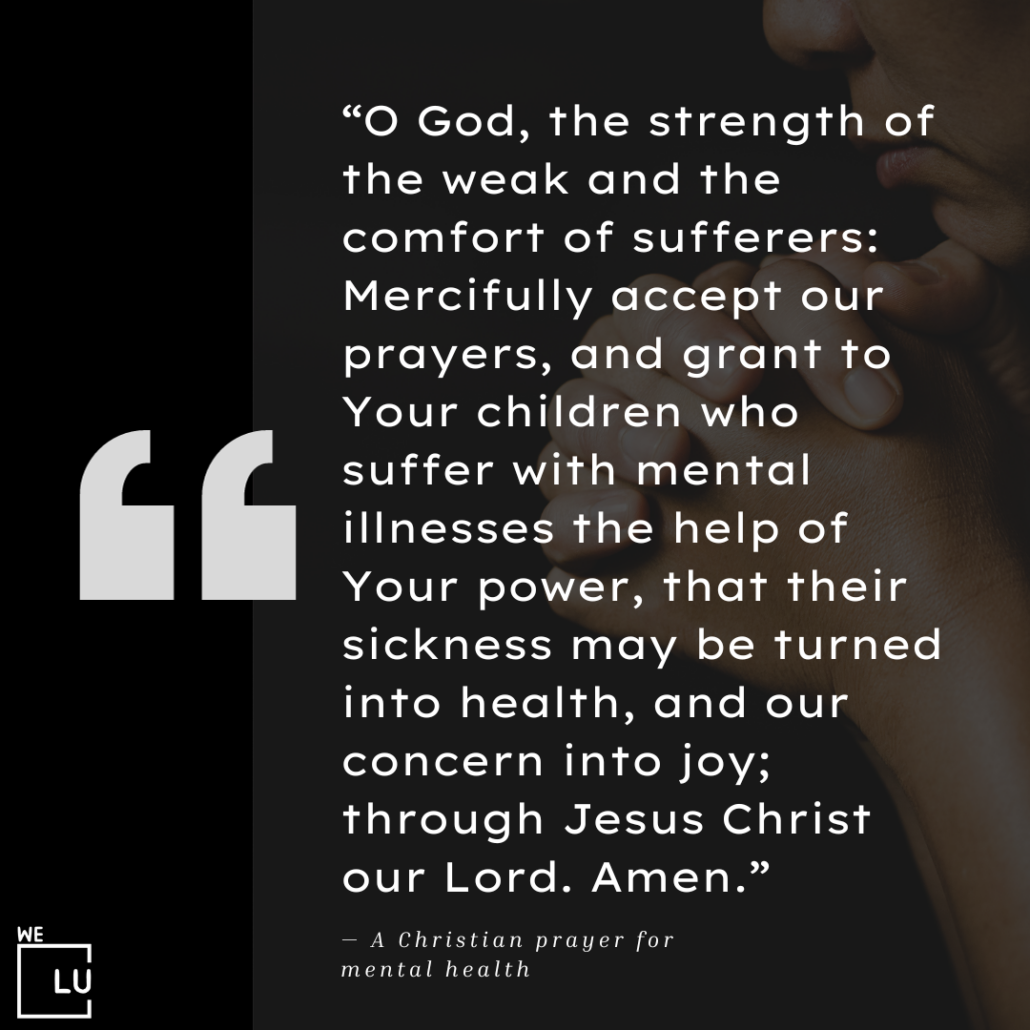God cares deeply about our mental health. The Bible offers guidance and comfort.
Mental health is a crucial aspect of our well-being. Many wonder what God says about it. The Bible, as a source of wisdom and comfort, addresses mental health. It speaks about peace, hope, and healing. God’s words can provide solace and strength in difficult times.
Understanding His perspective can help us find support and encouragement. This blog will explore biblical insights on mental health. We will look at relevant verses and teachings. Discover how faith and spirituality can impact your mental well-being. Join us in this journey to understand God’s view on mental health. Let’s find peace and guidance together.

Topic of Contents
ToggleBiblical Foundations
Understanding mental health from a biblical perspective can provide profound comfort. The Bible offers wisdom and insight for those struggling with mental health issues. It provides guidance and hope through its teachings. Let’s explore the biblical foundations related to mental health.
Scriptural References
The Bible addresses mental health through various scriptures. One key verse is Philippians 4:6-7. It encourages believers not to be anxious. Instead, they should present their requests to God through prayer. This brings peace that transcends understanding.
Another important scripture is Psalm 34:17-18. It states that the Lord is close to the brokenhearted. He saves those who are crushed in spirit. These verses offer comfort and assurance of God’s presence.
Isaiah 41:10 is also significant. It tells us not to fear because God is with us. It reassures us of God’s strength and support. These passages highlight God’s concern for our mental well-being.
Key Biblical Figures
Several biblical figures experienced mental distress. King David is one of them. He often expressed his anguish and sorrow in the Psalms. Despite his struggles, he found solace in God’s presence.
Elijah, the prophet, also faced deep despair. In 1 Kings 19, Elijah felt overwhelmed and sought death. God comforted him, providing food and rest. This shows how God cares for our mental and physical needs.
Job, too, suffered immense mental and physical pain. Yet, he remained faithful and found restoration through God. These figures illustrate that even the faithful encounter mental health struggles. They show that turning to God can bring comfort and healing.

God’s Compassion
God’s compassion is a central theme in the Bible. He shows care for all people, especially those struggling with mental health. This divine compassion can offer comfort, hope, and healing.
Love And Mercy
God’s love and mercy are boundless. The Bible tells us that His love is everlasting. He cares deeply for each person, regardless of their mental state. This love can provide a sense of belonging and acceptance. It reassures us that we are never alone.
Mercy is another aspect of God’s compassion. He forgives our mistakes and supports us in our struggles. This mercy can help lift the burden of guilt and shame. It allows us to find peace and start anew. By embracing God’s mercy, individuals can experience a renewed sense of hope.
Healing The Brokenhearted
God promises to heal the brokenhearted. The Bible is filled with verses that speak to His healing power. Psalm 147:3 states, “He heals the brokenhearted and binds up their wounds.” These words offer comfort to those suffering from mental pain. They remind us that healing is possible.
God’s healing is not just physical. It also addresses emotional and mental wounds. Through prayer, scripture, and faith, individuals can find solace. They can experience God’s healing touch in their lives. This spiritual healing can bring relief and restoration.
Mental Health In The Psalms
The Book of Psalms offers profound insights into mental health. It’s a collection of songs, prayers, and poems that address human emotions. These writings show how individuals dealt with sorrow, anxiety, and despair. They also offer hope, comfort, and encouragement. Let’s explore how the Psalms address mental health.
David’s Struggles
King David, the author of many Psalms, faced numerous mental health challenges. He expressed his deep anguish and fears openly. In Psalm 13:2, he wrote, “How long must I wrestle with my thoughts and day after day have sorrow in my heart?” David’s words show that even great leaders can experience mental struggles.
David’s honesty about his pain provides a powerful example. He did not hide his feelings. Instead, he brought them before God. This act of sharing his burdens is a form of therapeutic release. David’s struggles remind us that acknowledging our pain is the first step to healing.
Comfort And Hope
The Psalms also offer comfort and hope to those struggling with mental health. In Psalm 34:18, it says, “The Lord is close to the brokenhearted and saves those who are crushed in spirit.” These words remind us that God is near in our times of distress.
Another comforting verse is Psalm 23:4: “Even though I walk through the darkest valley, I will fear no evil, for you are with me.” This verse reassures us that we are not alone. God’s presence provides strength and courage to face our darkest moments.
Furthermore, Psalm 42:11 encourages us to hope in God: “Why, my soul, are you downcast? Why so disturbed within me? Put your hope in God, for I will yet praise him, my Savior and my God.” This verse is a reminder to shift our focus from our troubles to God’s goodness.
Jesus’ Teachings
Jesus’ teachings offer profound insights into mental health. His words provide hope, healing, and encouragement. Understanding these teachings can help one find peace and strength. Jesus addressed mental health through various parables and actions. He showed compassion and love for those suffering. His teachings are timeless and relevant today.
Parables Of Healing
Jesus often used parables to convey deep truths. These stories are full of wisdom and compassion. One such parable is the Good Samaritan. It shows the importance of helping those in need. Jesus taught that everyone deserves care and kindness. This includes those struggling with mental health issues.
Another parable is the Prodigal Son. This story highlights forgiveness and acceptance. Jesus emphasizes the value of every individual. He encourages us to support and welcome those who feel lost or isolated. These parables teach us to offer love and understanding.
Encouragement And Support
Jesus provided encouragement to those feeling burdened. He said, “Come to me, all who are weary, and I will give you rest.” This message is comforting for anyone facing mental health challenges. Jesus offers peace and a sense of belonging.
He also taught about the power of community. Jesus emphasized the importance of fellowship and support. He encouraged his followers to love one another. This love and support can greatly impact mental health. A strong, caring community can provide much-needed strength and encouragement.
Jesus’ teachings remind us of the importance of compassion. He taught us to care for each other, especially those in distress. His words offer hope and healing, guiding us towards better mental health.
Prayer And Meditation
Prayer and meditation hold significant roles in managing mental health. They provide comfort, peace, and a sense of connection with God. Through prayer, individuals can express their struggles and seek divine guidance. Meditation helps in calming the mind and focusing on God’s presence.
Strength Through Prayer
Prayer offers strength during tough times. It allows individuals to pour out their hearts to God. This act of surrender provides a sense of relief. In the Bible, Philippians 4:6-7 emphasizes the power of prayer. It encourages believers to present their requests to God. In return, God grants a peace that surpasses all understanding. Regular prayer helps build resilience and hope.
Mindfulness In Scripture
Scripture encourages mindfulness. Psalms 46:10 states, “Be still, and know that I am God.” This verse highlights the importance of pausing and reflecting. It reminds believers to focus on God’s presence. Mindfulness involves being present in the moment. It helps in reducing anxiety and stress. The Bible provides many instances of mindfulness practices. These practices encourage believers to stay grounded and centered in God’s love.
Community And Support
Community and support play a vital role in mental health. Feeling connected helps individuals deal with their struggles. God emphasizes the importance of community and support. He wants us to lean on each other for strength and guidance.
Church’s Role
The church can provide a safe space for those battling mental health issues. It offers spiritual guidance and emotional support. Church leaders can help connect individuals with mental health resources. Sermons and group discussions can address mental health topics. This creates awareness and reduces stigma.
Building A Support Network
Building a support network is crucial for mental well-being. Start with family and friends who understand your struggles. Join church groups or community organizations. These groups can offer emotional and spiritual support. Don’t hesitate to seek professional help when needed. A strong support network can make a significant difference.
Faith And Resilience
Faith can be a powerful tool for resilience in mental health struggles. It offers comfort and hope. When life gets tough, faith helps you stay strong. It provides a sense of purpose and direction. This guiding force can help you manage stress and anxiety.
Believing in a higher power can remind you that you are not alone. It encourages you to keep going even when times are hard. Faith can be a source of inner strength and peace. Let’s explore how faith and resilience work together through adversity and trust in God’s plan.
Overcoming Adversity
Adversity is a part of life. Everyone faces challenges. Some days are harder than others. Faith can help you face these tough times with courage. It reminds you that you can overcome any obstacle. You may feel weak, but God gives strength.
The Bible speaks about overcoming hardship. In James 1:2-4, it says trials test your faith. They help you grow and become stronger. Hard times do not last forever. Your faith can help you endure and rise above any challenge.
Trusting God’s Plan
Life does not always go as planned. Unexpected events can cause stress and worry. Trusting God’s plan can bring peace. It helps you believe there is a purpose in everything. Even in difficult times, God has a plan for your good.
Proverbs 3:5-6 encourages you to trust in the Lord. Lean not on your own understanding. Acknowledge Him in all your ways, and He will make your paths straight. Trusting God can help you find calm in the storm. It reminds you that He is in control, even when life feels chaotic.

Divine Promises
God’s promises offer hope and comfort to those struggling with mental health. These divine promises assure us of God’s presence and care. They remind us that we are not alone. Let’s explore these promises through different aspects of our mental well-being.
Hope For The Future
God’s word is filled with promises of hope. Jeremiah 29:11 states, “For I know the plans I have for you,” declares the Lord, “plans to prosper you and not to harm you, plans to give you hope and a future.” This verse assures us that God has a plan for our lives. A plan filled with hope and a bright future.
Renewed Mind And Spirit
God promises to renew our minds and spirits. Romans 12:2 encourages us to “be transformed by the renewing of your mind.” This transformation brings healing and peace. It allows us to see life from a new perspective. God also offers us a spirit of power, love, and self-discipline, as mentioned in 2 Timothy 1:7. This promise helps us overcome fear and anxiety.
The Bible also speaks about the importance of rest. Matthew 11:28 says, “Come to me, all you who are weary and burdened, and I will give you rest.” This promise invites us to find rest in God. To find peace and rejuvenation for our weary souls.
Frequently Asked Questions
What Does The Bible Say About Mental Health?
The Bible encourages caring for mental health. It speaks of peace, comfort, and seeking God’s help.
Does God Care About Mental Health Struggles?
Yes, God cares deeply. He offers comfort, strength, and peace to those struggling with mental health.
Are There Bible Verses About Anxiety And Depression?
Yes, verses like Philippians 4:6-7 and Psalm 34:17-18 address anxiety and depression, offering hope and peace.
Can Prayer Help With Mental Health Issues?
Prayer can bring comfort and peace. It helps build a stronger connection with God, offering support and guidance.
How Should Christians Approach Mental Health Treatment?
Christians should seek professional help when needed. Combining faith, prayer, and medical support can be very effective.
Conclusion
God cares deeply about mental health. He offers comfort and peace. Trust in His love. Seek support from faith communities. Pray and meditate regularly. Scriptures provide guidance and hope. Remember, you are not alone. Reach out to others. Share your struggles.
Find strength in God’s words. Embrace faith and healing. Let His wisdom guide you. Your mental well-being matters to Him. Keep faith strong.







